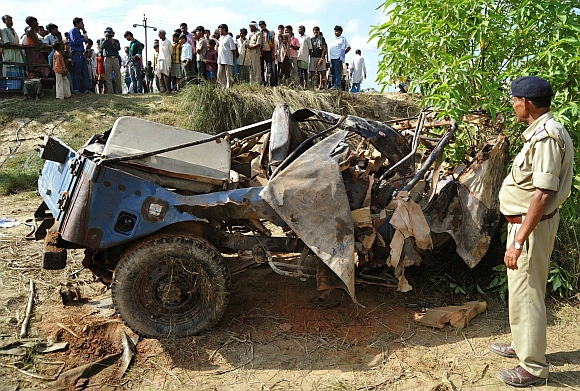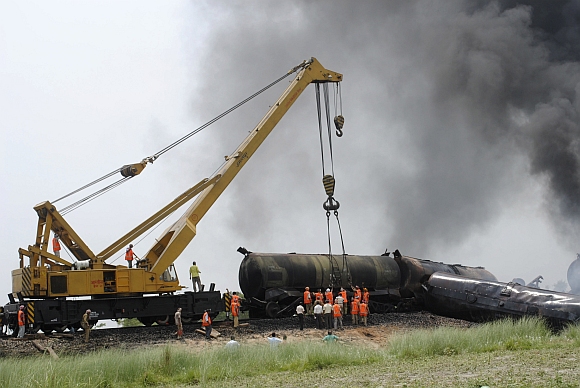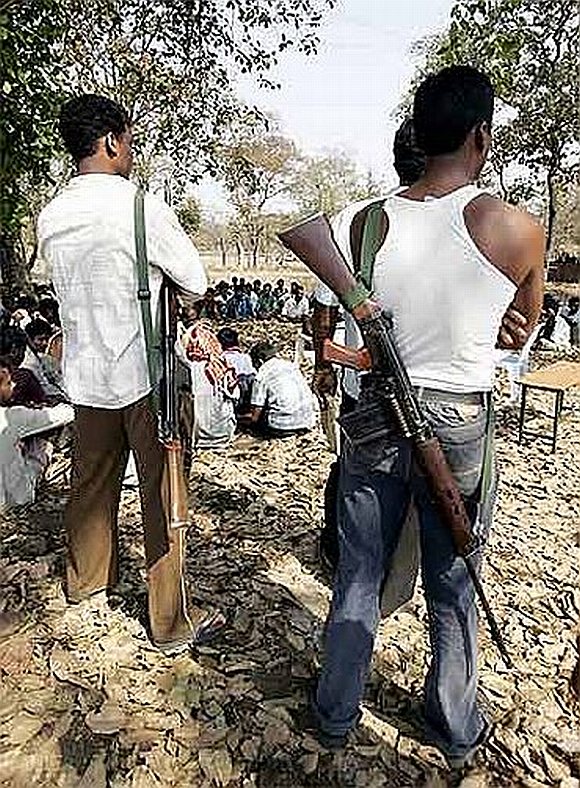Photographs: Krishna Murari Kishan/Rediff
The last six to seven years of the Nitish Kumar government in Bihar has not seen any significant increase in Maoist violence, which nevertheless continues to take a toll of lives and government property.
According to figures compiled by the state police headquarters, in 2008, the Maoists destroyed three government buildings, blasted railway tracks at six places, besides two private buildings, torched five JCB machines used in road construction and 12 mobile phone towers.
In 2009, the ultras blew up 15 government schools and nine government buildings, destroyed rail tracks at seven places and other railway property, 17 mobile phone towers, roads at 11 places and set fire to 29 JBC machines of private road construction firms.
In 2010, eight government school buildings, four government buildings and three private houses, roads at three places and 8 mobile phone towers were destroyed and three JCB machines torched.
In 2011, the ultras blew up 13 government schools, two government buildings, five houses, railway tracks at five places and other railway properties, besides burning 22 JCB machines and 19 mobile phone towers, the figures reveal.
...
How Maoists are disrupting lives in Bihar
Image: Workers remove damaged oil tankers from rail tracks in Chintawanpur in BiharPhotographs: Reuters
"The Maoists strike after contractors fail to meet their extortion demands demonstrating that greed has replaced 'isms' for the ultras," officials said.
The state recorded 149 Maoist-related incidents while 33 people fell victim, according to available statistics for the last four years.
There were 15 encounters between security personnel and Maoists in 2011, while the ultras attacked the police on three occasions in which three policemen were killed.
On the other hand, 11 Maoists were killed during the encounters. Additional Director General of Police (Law and Order) S K Bhardwaj said, "The state government is making efforts for development work, but Maoists are coming in the way."
Bhardwaj said the money spent for development was the hard earned money of the people. "It is not good," he said.
The Bihar government has a rehabilitation programme for Maoist returning to the mainstream of society, official sources said.
...
How Maoists are disrupting lives in Bihar
Image: Maoists at their hideoutPhotographs: Reuters
Under the scheme, an immediate assistance of Rs 10,000 was given while another Rs two lakh was provided for business -- Rs one lakh as grant and another Rs one lakh as loan from banks.
Besides, the state government also provides Rs 3,000 per month as sustenance allowance.
On January 24, the state government under a centrally sponsored police modernisation plan sanctioned Rs 170 crore for construction of 85 new police buildings in Maoist affected districts.
Under the plan, Rs 30 crore was sanctioned during the year 2010-2011 for construction of 30 police station buidings in Aurangabad, Gaya, Nawada, Patna, Nalanda, Arwal, Jehanabad, Rohtas, Bhojpur, Kaimur, Jamui, Munger, East Champaran, West Champaran and Sitamarhi districts.
Nine Maoist hit districts where special infrastructure was required to be created were East Champaran, West Champaran, Bhojpur, Kaimur, Sitamarhi, Patna, Nalanda, Nawada and Munger districts.
The government has also launched Sarkar Aap Ke Dwar (government at the door steps of people) programme in eight Maoist hit districts in Bihar.




article